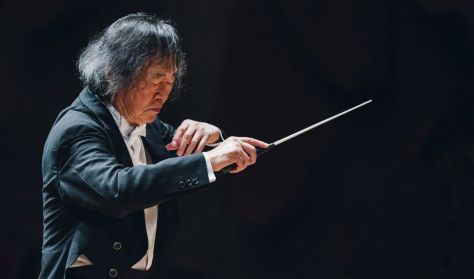
Kobayashi Kocsis season ticket / 4
Carl Orff: Carmina Burana

Carl Orff: Carmina Burana
Ön egy múltbeli eseményre keresett rá. Kérjük, válogasson aktuális kínálatunkból a Jegy.hu keresőjében!
Last event date: Monday, May 02 2022 7:30PM
Monday, 2 May 2022, 7.30 pm
Approx. until 8.30 pm
Müpa Budapest – Béla Bartók National Concert Hall
Kocsis season ticket / 4
Kobayashi
Carl Orff: Carmina Burana
Zita Szemere soprano
István Horváth tenor
Csaba Szegedi baritone
Hungarian National Choir (choirmaster: Csaba Somos)
The choir of the Zoltán Kodály Hungarian Choir School (choirmaster: Ferenc Sapszon)
Hungarian National Philharmonic Orchestra
Conductor: Ken-Ichiro Kobayashi
Orff’s large-scale oratorical composition based on a collection of medieval Latin poetry became one of the most popular classical music works of the 20th century. The piece’s popularity rivalled that of rock music – truly a valid comparison as pulsating rhythm was also a defining element in Carmina Burana’s new style of refined simplicity and archaic influences. The theme of the work deals with the wheel of fortune, wine and rapturous love. The conductor is the legendary Japanese wizard Ken-Ichiro Kobayashi, who has formed an intimate relationship with the Hungarian Philharmonic Orchestra. It promises to be a truly special evening!
Originally, the title Carmina Burana referred not a piece of music, but rather a medieval (13th century) codex containing a collection of poetry. The texts, predominantly written in Latin and partially in Middle High German, Old French and Provencal, were found in the Benediktbeuern Monastery in Bavaria. In 1935/36, the German composer Carl Orff (1895–1982) set 24 verses of this goliardic poetry of scholars and monks to music, creating a large-scale cantata. The musical language of the work is characterised by rawness and directness; a modernisation of an imagined medieval style. A ‘neo’-style, then, yet one that is still thrillingly and zestfully new, just like the numerous neoclassical works that Stravinsky composed around the same time. There is something magical about Carmina Burana, a feeling that is enhanced by the vital role of repetition in the work. This remarkably stirring, hypnotising music never fails to hit the spot. Ken-Ichiro Kobayashi, the one-time winner of the Budapest International Conducting Competition, has been a favourite of Hungarian audiences for half a century. Kobayashi guarantees thrills in every genre and style, though he is always most at home when dealing with monumental oratorical compositions that require a large concert apparatus. So we can be sure that under his baton, the true sorcery of Carmina Burana will be brought to the fore.
Rudi van Dantzig – Toer van Schayk / Pyotr Ilyich Tchaikovsky SWAN LAKE Classical ballet in three acts
Alen Menken, Stephen Schwartz és Peter Parnell varázslatosmusicalje Victor Hugo ikonikus regényéből, a Disney rajzfilmje alapján készült. A darab érzékenyen mesél a szeretetről, a kitartásról és az önfeláldozásról. Esmeralda, a szegény cigánylány és Quasimodo, a torz külsejű, ám önzetlen harangozó története könnyeket csal mindenki szemébe.
A nagyszabású musicalt, amelyben a Halál lép elő főszereplővé, az egyik legnépszerűbb zenés színházi darabként tartják számon, 1992 óta hódít…
Artisjus- és eMeRTon-díjas rapper, dalszövegíró, reklámszakember, producer, szinkronszínész, műsorvezető, Romhányi után a legnagyobb rímhányó, A dzsungel könyve, a Pál utcai…
item(s) in basket
total:
Time limit has expired. Please, put item(s) in to basket again.